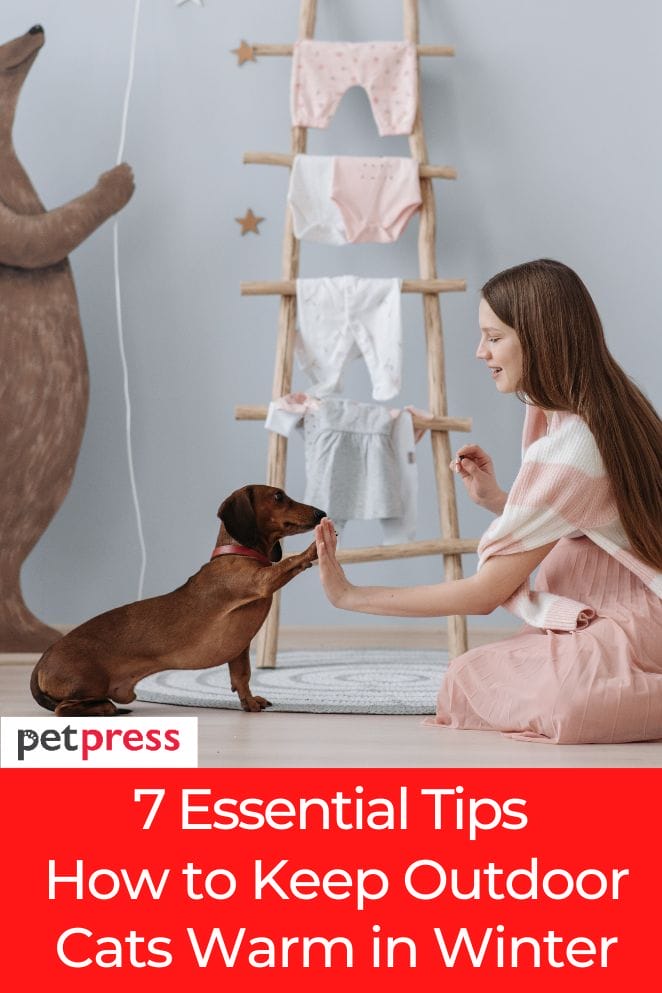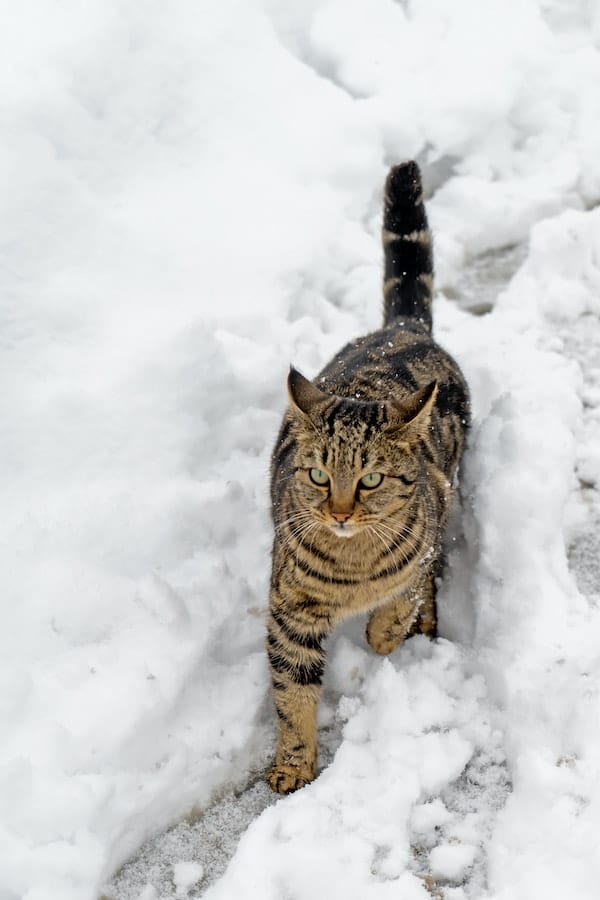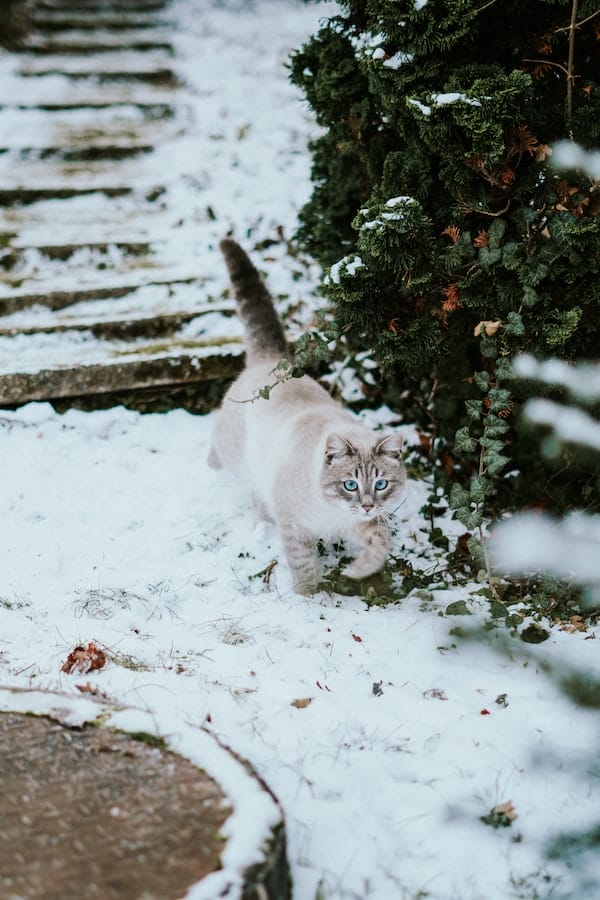
Winter can present huge challenges for outdoor cats, as they wrestle with cold temperatures and harsh weather conditions.
As a responsible pet owner or caretaker, taking measures to guarantee the well-being and comfort of these feline companions is critical during the colder months.
In this article, we will dive into effective strategies and useful tips to assist with guarding outdoor cats warm and safe when the temperature decreases.
By implementing these measures, we can show our compassion and care for these furry companions during the chilly season.
Understanding the Challenges of Winter for Outdoor Cats
Winter brings freezing temperatures, icy winds, and reduced food availability, making survival challenging for outdoor cats.
Their natural ability to adapt to some extent helps, but they still need assistance to stay warm and protected.
Providing Adequate Shelter

Choosing the Right Shelter
Outdoor cats need a shelter that provides protection from the elements. A sturdy, waterproof, and insulated shelter with a small entrance helps retain heat and keep out drafts.
Insulating the Shelter
Adding insulation to the shelter can significantly enhance its warmth-retention capabilities. Insulating materials such as foam insulation or reflective blankets can be used to line the shelter’s interior.
Placing the Shelter Appropriately
Positioning the shelter in a dry and elevated location, away from direct wind or snow, helps maintain a comfortable environment inside.
Warm Bedding Options
Importance of Insulated Bedding
Proper bedding is crucial to keep outdoor cats warm. Insulated bedding acts as a barrier between the cat and the cold ground, preserving body heat.
Utilizing Straw or Hay
Straw or hay is excellent bedding material as it provides insulation and repels moisture. Create a thick layer of straw or hay inside the shelter to keep the cat cozy.
Using Heated Beds
Heated beds specifically designed for outdoor use can provide extra warmth during freezing temperatures. These beds are low-voltage and safe for outdoor use.
Feeding and Hydration
Increasing Caloric Intake
Outdoor cats require more calories in winter to maintain their body temperature. Consult with a veterinarian to determine the appropriate diet and feeding schedule.
Providing Warm Meals
Serving warm meals to outdoor cats can help them regulate body temperature and provide comfort. Wet food can be warmed slightly to entice the cats and keep them nourished.
Ensuring Access to Fresh Water
Water sources can freeze quickly in winter, so it’s vital to use heated water bowls or replace the water frequently to prevent dehydration.

Protecting from Frostbite and Hypothermia
Recognizing the Signs of Frostbite and Hypothermia
Knowing the signs of frostbite and hypothermia, such as pale skin, discolored extremities, shivering, or lethargy, is essential. Prompt action can prevent serious health issues.
Tips to Prevent Frostbite and Hypothermia
By following the shelter and bedding recommendations mentioned earlier, providing additional heat sources, and regularly checking on the cats, you can reduce the risk of frostbite and hypothermia.
Creating a Winter-Friendly Environment
Windbreaks and Barriers
Placing windbreaks, such as tarps or bales of straw, around the shelter can shield cats from chilling winds. Barriers also prevent snow accumulation around the shelter.
Heated Water Bowls
Investing in heated water bowls ensures that outdoor cats have access to liquid water throughout the day, reducing the risk of dehydration.
Outdoor Heating Options
Supplemental heating options like heated pads or mats designed for outdoor use can provide additional warmth in extremely cold conditions.
Monitoring the Cats
Regular Check-ups and Observation
Regularly checking on outdoor cats is the best way to ensure their safety and well-being in winter.
Observe their behavior and physical condition for any signs of stress or illness, especially during extreme weather conditions.
Seeking Veterinary Care when Necessary
If you notice any indications of frostbite or hypothermia, look for veterinary consideration right away. In some cases, an expert might suggest bringing the feline inside for additional protection and comfort.
Educating the Community
Spreading Awareness
Educating the local community about the difficulties faced by outdoor cats in winter is an effective method for ensuring their safety and well-being. Promote responsible pet ownership and offer tips to really focus on these feline companions during chilly weather.
Collaborating with Local Animal Shelters
Collaborate with local animal shelters to give resources and help to outdoor cats. You can also help by offering food, bedding, or temporary shelter during outrageous weather conditions.

Conclusion
In the winter months, outdoor cats can flourish and stay protected with the right preparation and care.
Finding the opportunity to give them a suitable shelter, cozy bedding, a more than adequate supply of food and water, and regular monitoring of their well-being are fundamental elements in ensuring their comfort and survival during the cold season.
By mindfully taking care of these aspects, we can show our love and responsibility regarding these valuable cat companions, ensuring they have a warm and secure place to call home during the chilly days to come.
FAQs
Outdoor cats can survive in winter, but they require extra support and care to stay warm and healthy.
Yes, heated beds designed for outdoor use are safe for cats. They provide warmth without posing any significant hazards.
Signs of a cat being too cold include shivering, seeking warm spots, curling up tightly, or displaying signs of discomfort or distress.
If possible, it is recommended to bring outdoor cats indoors during winter to provide optimal warmth and protection.
- Does Cat Litter Melt Ice? The Complete Guide to Winter Safety - January 30, 2026
- Happy Tail Dogs: Understanding This Common Canine Condition - January 29, 2026
- How Cold Can Outdoor Cats Handle? Feline Winter Safety - January 27, 2026


GIPHY App Key not set. Please check settings